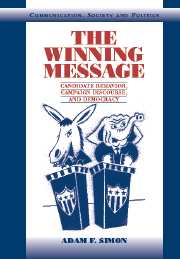Book contents
- Frontmatter
- Contents
- List of Figures
- List of Tables
- Acknowledgments
- 1 Introduction
- 2 Dialogue: A Standard for Campaign Discourse
- 3 Understanding Campaigns: Background, Theory, and Methods
- 4 The Ventriloquist's Hand: A Game-Theoretic Model of Campaigns
- 5 Duck or Punch? Dialogue in a California Gubernatorial Election
- 6 Dialogue and Its Effects in Contemporary American Elections
- 7 Explaining and Predicting the Occurrence of Dialogue
- 8 Conclusion: Toward More Substantive Campaign Discourse
- Appendix A Analysis of the Model of Campaigns in Mass Elections
- Appendix B Experimental Procedures
- References
- Index
3 - Understanding Campaigns: Background, Theory, and Methods
Published online by Cambridge University Press: 18 November 2009
- Frontmatter
- Contents
- List of Figures
- List of Tables
- Acknowledgments
- 1 Introduction
- 2 Dialogue: A Standard for Campaign Discourse
- 3 Understanding Campaigns: Background, Theory, and Methods
- 4 The Ventriloquist's Hand: A Game-Theoretic Model of Campaigns
- 5 Duck or Punch? Dialogue in a California Gubernatorial Election
- 6 Dialogue and Its Effects in Contemporary American Elections
- 7 Explaining and Predicting the Occurrence of Dialogue
- 8 Conclusion: Toward More Substantive Campaign Discourse
- Appendix A Analysis of the Model of Campaigns in Mass Elections
- Appendix B Experimental Procedures
- References
- Index
Summary
In this chapter, I present the foundations for a scientific inquiry into the occurrence of campaign dialogue. In the first section I discuss the recent history of campaigns focusing on the change wrought by the advent of television and sample surveys. The point of this discussion is to contextualize and to establish the importance of this study as well as the importance of treating the campaign as a holistic phenomenon. Next, I move to review extant understanding of the campaign, especially the so-called Michigan and Rochester schools and the notion of low information rationality. I conclude with a sketch of a theory of campaigns that forms the basis for the formal (game-theoretic) model in the next chapter.
Onlookers have been complaining about the quality of public discourse for quite some time. As I observed in the previous chapter, the ferocity of this criticism has not decreased. In the current milieu, however, the most common response to critics of contemporary political campaigns – that they have always been shallow and we can expect little more – fails to acknowledge the increasing need for substance. Not so long ago, party organizations, exemplified by the smoke-filled backroom, were the centerpiece of American politics. They served as a conduit for passing information as well as a means toward gaining votes. The party filtered and transferred information between constituents and elected officials, so parties were responsible for organizing and facilitating the communication between government and the public necessary in a complex democracy (Aldrich 1995; Sundquist 1973).
- Type
- Chapter
- Information
- The Winning MessageCandidate Behavior, Campaign Discourse, and Democracy, pp. 27 - 43Publisher: Cambridge University PressPrint publication year: 2002



